Israel has announced a ‘tactical pause’ to fighting in populated parts of Gaza to address a surge in hunger and allow in UK-backed aid air drops.
The steps mean food can now enter the regions for 10 hours a day as Israel faces a wave of international criticism over its conduct in the 21-month conflict.
A pause to fighting will begin from today, taking place between 10am and 8pm in Gaza City, Deir al-Balah and Muwasi – three areas of the territory with large populations, to ‘increase the scale of humanitarian aid’ entering the territory.
The Israeli military also stated it has carried out aid airdrops into Gaza, including packages of aid with flour, sugar and canned food.
Prime Minister Keir Starmer condemned the ‘utterly horrifying’ images of children starving, adding ‘news that Israel will allow countries to airdrop aid into Gaza has come far too late’.
Food experts have warned for months of the risk of famine in Gaza, where Israel has restricted aid because it says Hamas siphons off goods to help bolster its rule.
Images emerging from Gaza in recent days of emaciated children have fanned global criticism of Israel, including by close allies, who have called for an end to the war and the humanitarian catastrophe it has spawned.
Israel said the new measures were taking place while it continues its offensive against Hamas in other areas.
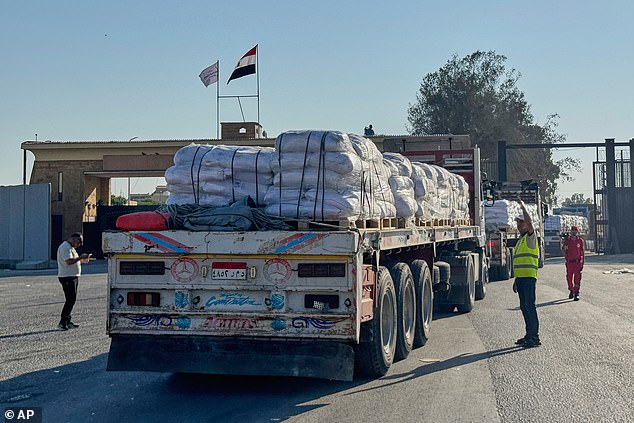
Trucks carrying humanitarian aids enter the Rafah crossing between Egypt and the Gaza Strip today
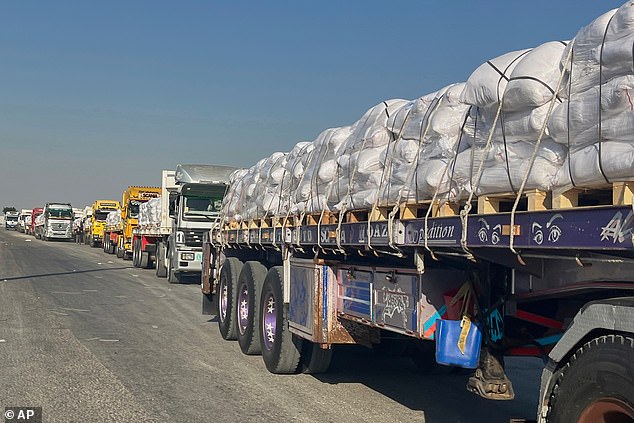
The military said it would begin a ‘tactical pause’ in Gaza City, Deir al-Balah and Muwasi, three areas of the territory with large populations, to ‘increase the scale of humanitarian aid’ entering the territory
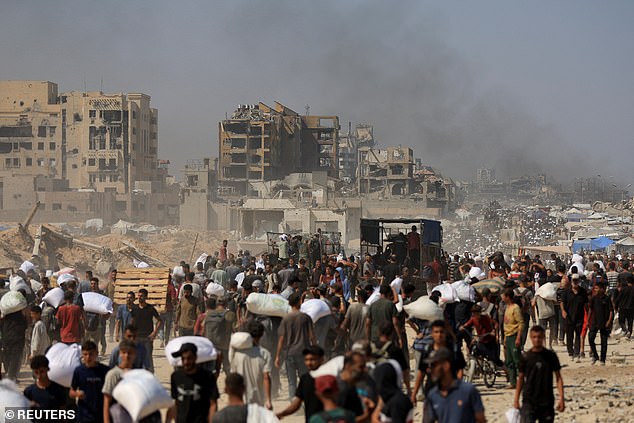
Palestinians carry aid supplies that entered Gaza through Israel, in Beit Lahia in the northern Gaza Strip
The local pause in fighting came days after ceasefire efforts between Israel and Hamas appeared to be in doubt.
On Friday, Israel and the US recalled their negotiating teams, blaming Hamas, and Israel said it was considering ‘alternative options’ to ceasefire talks with the militant group.
After ending the latest ceasefire in March, Israel cut off the entry of food, medicine, fuel and other supplies completely to Gaza for two and a half months, saying it aimed to pressure Hamas to release hostages.
Under international pressure, Israel slightly eased the blockade in May.
Since then, it has allowed around 4,500 trucks for the UN and other aid groups in to distribute.
The average of 69 trucks a day, however, is far below the 500 to 600 trucks a day the UN says are needed for Gaza.
The UN says it has been unable to distribute much of the aid because hungry crowds and gangs take most of it from its arriving trucks.
As a way to divert aid delivery away from the UN, Israel has backed the US-registered Gaza Humanitarian Foundation, which in May opened four centres distributing boxes of food supplies.
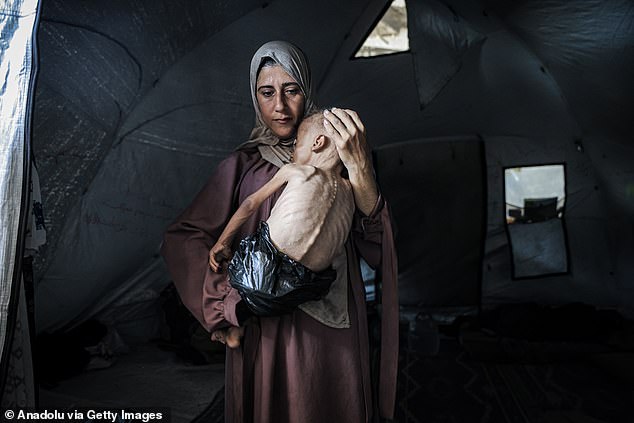
Muhammad Zakariya Ayyoub al-Matouq, a 1.5-year-old child in Gaza City, Gaza, faces life-threatening malnutrition as the humanitarian situation worsens due to ongoing Israeli attacks and blockade
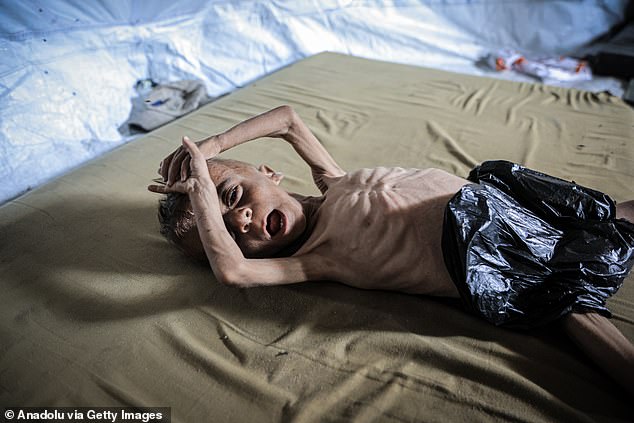
More than 1,000 Palestinians have been killed by Israeli forces since May while trying to get food, mostly near those new aid sites, the UN human rights office says
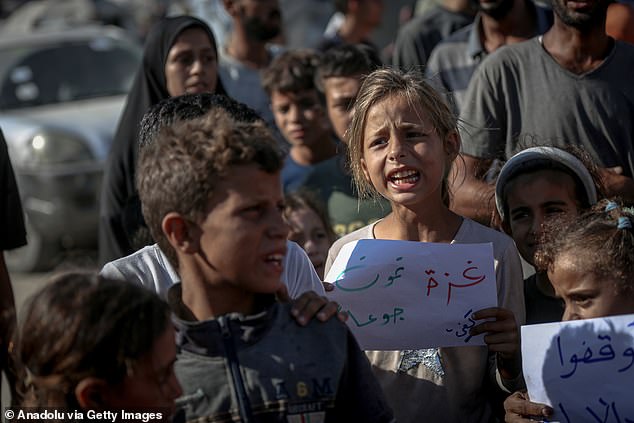
Palestinian journalists, children, and families gather to demand an end to Israeli attacks and the entry of humanitarian aid, on July 19
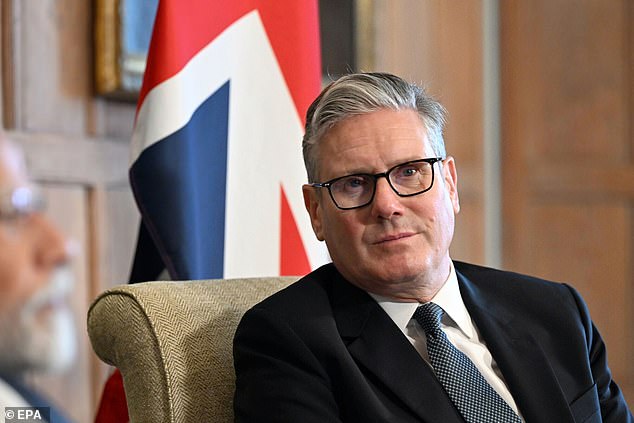
Keir Starmer said: ‘The images of starvation and desperation in Gaza are utterly horrifying’
More than 1,000 Palestinians have been killed by Israeli forces since May while trying to get food, mostly near those new aid sites, the UN human rights office says.
Israel has railed against the UN throughout the war, saying that its system allowed Hamas to steal aid, without providing evidence.
The UN denies that claim and says its delivery mechanism was the best way to bring aid to Palestinians.
The military said the new steps were made in co-ordination with the UN and other humanitarian groups.
Much of Gaza’s population, squeezed by fighting into ever tinier patches of land, now relies on aid.
Recent conflict was sparked following Hamas’s attack on southern Israel on October 7, 2023, saw militants kill 1,200 people, mostly civilians, and took 251 hostages.
Hamas still holds 50 hostages, more than half of them believed to be dead.
Israel’s retaliatory offensive has killed more than 59,700 Palestinians.
The count doesn’t distinguish between militants and civilians, but the Palestinian Health Ministry says that more than half of the dead are women and children.
It is understood that Sir Keir will press Donald Trump at a meeting in Scotland on Monday as to whether more can be done to stop the conflict.
While the Prime Minister will urge for securing a ceasefire, it is feared this will raise the risk of a clash with Mr Trump who has insisted Hamas does not want peace.
Sir Keir said: ‘Israel must allow aid in over land to end the starvation unfolding in Gaza. The situation is desperate.
‘We are urgently accelerating efforts to evacuate children who need critical medical assistance to the UK for treatment.’












